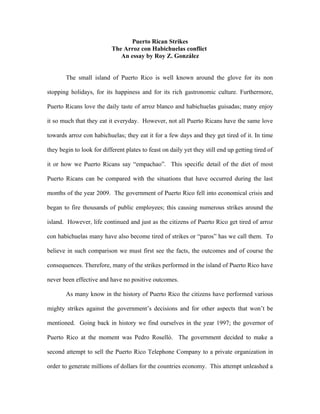
Puerto rican strikes the arroz con habichuelas conflict
- 1. Puerto Rican Strikes The Arroz con Habichuelas conflict An essay by Roy Z. González The small island of Puerto Rico is well known around the glove for its non stopping holidays, for its happiness and for its rich gastronomic culture. Furthermore, Puerto Ricans love the daily taste of arroz blanco and habichuelas guisadas; many enjoy it so much that they eat it everyday. However, not all Puerto Ricans have the same love towards arroz con habichuelas; they eat it for a few days and they get tired of it. In time they begin to look for different plates to feast on daily yet they still end up getting tired of it or how we Puerto Ricans say “empachao”. This specific detail of the diet of most Puerto Ricans can be compared with the situations that have occurred during the last months of the year 2009. The government of Puerto Rico fell into economical crisis and began to fire thousands of public employees; this causing numerous strikes around the island. However, life continued and just as the citizens of Puerto Rico get tired of arroz con habichuelas many have also become tired of strikes or “paros” has we call them. To believe in such comparison we must first see the facts, the outcomes and of course the consequences. Therefore, many of the strikes performed in the island of Puerto Rico have never been effective and have no positive outcomes. As many know in the history of Puerto Rico the citizens have performed various mighty strikes against the government’s decisions and for other aspects that won’t be mentioned. Going back in history we find ourselves in the year 1997; the governor of Puerto Rico at the moment was Pedro Roselló. The government decided to make a second attempt to sell the Puerto Rico Telephone Company to a private organization in order to generate millions of dollars for the countries economy. This attempt unleashed a
- 2. 41 day strike by the employees of the company; this strike was violent, bloody and full of brutality. In addition, many citizens that were not employed by the company decided to join the cause and make a yellow t-shirt with a cow on it that said “Puerto Rico no se vende”. Even though this creative, powerful and violent strike caused a head ache to our government the PRTC was sold in the year 1999, generating two thousand million dollars to the government. Another fascinating strike occurred the 15th of October, 2009 when 100,000 Puerto Ricans created a massive strike that froze the entire country for 1 whole day. This enormous strike originated from the 17,000 sackings of public employees; this peaceful yet massive protest was embraced by hundreds of Puerto Ricans throughout the island including all University of Puerto Rico campuses. However, the strike ended and still the government continued sacking more employees. In addition, more sackings are yet to occur in January 2010. History still gives solid proof of the failure of strikes especially in the UPR. During the year 2005 the president of the UPR “Antonio Garcia Padilla” decided to raise $10 to tuition credits. This raise provoked the students to paralyze all UPR campuses; the strike lasted about 3 weeks. Even though the strike mobilized all students the President of the UPR raised ten dollars per credit to all freshmen or “prepas” and eventually the entire student body. In sum, history has proved that strikes have been inappropriate and useless. All strikes are believed to cause positive outcomes according to those who participate in them. However, what happens when they bring negative outcomes? Who will respond for those negative outcomes? What will the promoters of such strikes do afterwards? As mentioned before strikes have not been as successful as many believe; in fact, they become a problem. Strikes that have occurred had caused millions of dollars in
- 3. losses for the government of this country. In addition, economy has not been the only matter that has been damaged by such movements; students and I state all the student body of the University of Puerto Rico has been affected by such strikes. Concerning the losses of the government the Puerto Rican press interviewed “José García” who is a member of the board of directors of the Puerto Rican Association of Economists; the matter discussed in the interview is, who looses in this strike? This expert stated “this strike caused great impact on the economy of Puerto Rico causing millions in losses including the sackings”. Furthermore, strikes have not only affected the economy but have directly affected the calendar of the University of Puerto Rico. After these strikes the students are left with nothing more than accumulated assignments and a longer, tiring semester. Thus, at the moment of each strike many students decide to visit local beaches and bars instead of supporting the strike they voted in favor of; now the rice is over cooked. To conclude, I quote President John F. Kennedy who said “It’s not what your country does for you is what you do for your country”, these words have been forgotten by the people of Puerto Rico, by doing so our country looses more instead of gaining more. There are better diplomatic ways to resolve these problems; strikes have literally been proved to be unsuccessful. And so we remember the arroz and habichuelas, we eat it and get tired of it; why not break the habit and try something new for a change.
